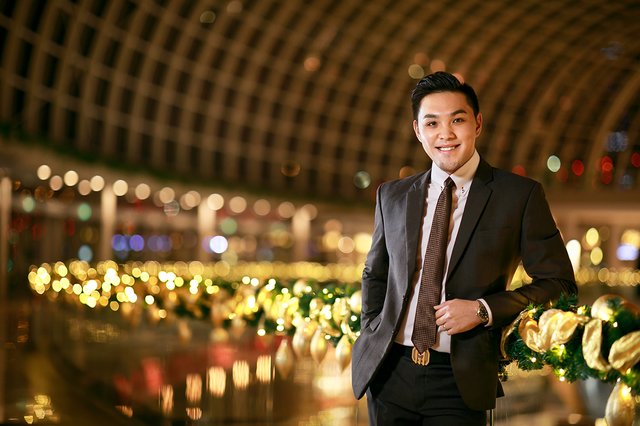Dato’ Joel Low – Asia’s Agri-tech Hothouse

Singapore is not known for its agriculture, but Agrivo International CEO Dato’ Joel Low is about to change that, with the launch of the largest agri-tech farm in Asia and a world-first Global Agricultural Exchange in 2019.
By Joanne Leila Smith
According to the World Government Summit report released in February 2018, the UN Agenda for Sustainable Development included a commitment to end world hunger by 2030. As of 2018, approximately 800 million people worldwide go hungry, and based on current projections, 650 million people will suffer from malnutrition by 2030. As population growth is projected to reach 11.2 billion by 2050, The UN Food and Agriculture Organisation claims 70 percent more food will need to be produced to feed the global population by this time.
The report claims that the agricultural market share of global GDP continues to decline – indicating traditional farming methods will not meet worldwide demand due to scarcity of natural resources, food waste and demographics.
On the demographic front, consumer behaviour trends towards a higher demand for animal protein, driven by increasing urbanization and rising middle-class incomes. The effects of increased meat production on the environment has been widely documented; according to the report, raising livestock accounts for nearly one-fourth of all global water use in agriculture.
As food demand increases, the rural population continues to decline – and those that remain, reflect an ageing population lumped with increasingly degraded farmlands. According to the World Summit report, 25 percent of all farmland is already rated as highly degraded and water resources are stressed with more than 40 percent of the world’s rural population living in water-scarce areas. Traditional agriculture methods is a primary cause of farmland degradation, caused by deforestation, improper fallow periods, reduced crop rotations, livestock overgrazing and excessive fertilizer use to increase yields lead to soil nutrient imbalances.
While irrigation systems maximise usage efficiency, growing populations make water scarcity a genuine threat. Investment for water management in developing countries to meet the 2050 mark is USD 1 trillion.
Current food waste wastage is estimated to account for 25 percent of all fresh water consumption globally, with up to 50 percent of all foods produced globally never eaten. Food wastage is a massive market inefficiency, with hunger not just reflected in developing nations. In the UK, over 1 million people accessed a food bank in 2017, and the US, 40 million Americans live in food poverty.
Faced with the impending challenge of sustainably feeding everyone, the market is witnessing a rise in Agri-tech start-ups and innovation, including 3D printing of foods, cultured meat, seawater agriculture, and high-tech vertical farming including the use of AI, sensors, automation and IoT systems to increase efficiencies, reduce food and resources wastage and pesticides usage, while increasing yields across the entire value chain.
According to Agfunder News, investment in Agri-tech has grown more than 80 percent since 2012. Japanese billionaire Masayoshi Son launched SoftBank Vision Fund, invested USD 200 million into US-based vertical farming startup Plenty; which also received funding from US billionaires Jeff Bezos and Eric Schmidt. Hot agri-tech start-ups are also making a splash in Dubai, Israel, Brazil and India.
Across the Pacific in Singapore, Agrivo International CEO Dato’ Joel Low is leading the charge in agri-tech in Asia, with ambitious plans to expand into a three-stories, 210,000 sq feet high-tech vertical farm in Singapore which will make it the largest of its kind in Asia by the end of Q1 2019.
After completing his degree in Hospitality, Dato’ Low started his career as a Sommelier. In early 2010, Dato’ Low’s early entrepreneurial ventures were in restaurant acquisitions before venturing into property development in Cambodia through Agrivo International, an agriculture investment and management company. As a co-founder, Dato’ Low is responsible for managing Agrivo’s subsidiaries ranging from established SME’s to new start-ups.
“I have always loved the food industry, and as I began to understand more about agriculture, what goes into the growing process and sustainable farming practices, we started investing in pepper plantations in Kampot, Cambodia. Kampot Pepper is currently double the world pepper price because it is highly aromatic with intense flavour profiles. As a trained Sommelier I take aroma seriously,” laughs Dato’ Low.
According to Dato’ Low, pepper takes three years to harvest, so to ensure income between yields, his company diversified by purchasing organic mushroom farms in Malaysia; the harvest is two weeks from seed. They also diversified into traditional farming fruit plantations in Indonesia, including papaya, watermelon and Calamansi.
“There is a huge demand in Asia for mushrooms. Besides fresh produce, we recently launched our Mushroom Kingdom Shrooms Bites [dehydrated mushroom chips] and we also have Mushroom Growth Kits which we give to educate students as well as corporates on how mushrooms grow, which everyone loves. The younger Singaporeans do not know where our food comes from, so we partnered with the Ministry of Education to go into schools and teach kids how fresh produce is grown,” says Dato’ Low...
...to read more, visit https://indvstrvs.com/dato-joel-low/
I upvoted your post.
Cheers to you.
@Pinoy
Posted using https://Steeming.com condenser site.